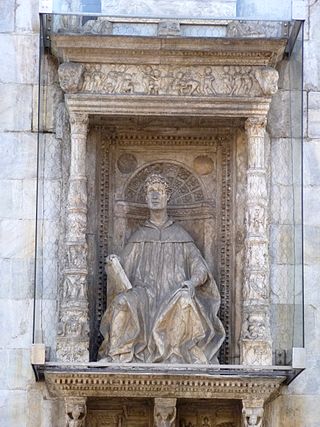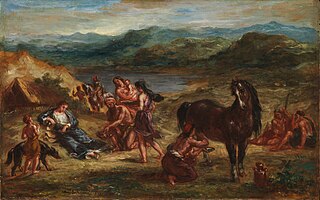The elegiac couplet is a poetic form used by Greek lyric poets for a variety of themes usually of smaller scale than the epic. Roman poets, particularly Catullus, Propertius, Tibullus, and Ovid, adopted the same form in Latin many years later. As with the English heroic couplet, each pair of lines usually makes sense on its own, while forming part of a larger work.

Quintus Horatius Flaccus, known in the English-speaking world as Horace, was the leading Roman lyric poet during the time of Augustus. The rhetorician Quintilian regarded his Odes as just about the only Latin lyrics worth reading: "He can be lofty sometimes, yet he is also full of charm and grace, versatile in his figures, and felicitously daring in his choice of words."
Latin literature includes the essays, histories, poems, plays, and other writings written in the Latin language. The beginning of formal Latin literature dates to 240 BC, when the first stage play in Latin was performed in Rome. Latin literature would flourish for the next six centuries. The classical era of Latin literature can be roughly divided into the following periods: Early Latin literature, The Golden Age, The Imperial Period and Late Antiquity.

Publius Ovidius Naso, known in English as Ovid, was a Roman poet who lived during the reign of Augustus. He was a contemporary of the older Virgil and Horace, with whom he is often ranked as one of the three canonical poets of Latin literature. The Imperial scholar Quintilian considered him the last of the Latin love elegists. Although Ovid enjoyed enormous popularity during his lifetime, the emperor Augustus banished him to Tomis, a Dacian province on the Black Sea, where he remained a decade until his death.

Gaius Plinius Caecilius Secundus, born Gaius Caecilius or Gaius Caecilius Cilo, better known as Pliny the Younger, was a lawyer, author, and magistrate of Ancient Rome. Pliny's uncle, Pliny the Elder, helped raise and educate him.

An epistle is a writing directed or sent to a person or group of people, usually an elegant and formal didactic letter. The epistle genre of letter-writing was common in ancient Egypt as part of the scribal-school writing curriculum. The letters in the New Testament from Apostles to Christians are usually referred to as epistles. Those traditionally attributed to Paul are known as Pauline epistles and the others as catholic epistles.
Letter, letters, or literature may refer to:

The Tristia is a collection of letters written in elegiac couplets by the Augustan poet Ovid during his exile from Rome. Despite five books of his copious bewailing of his fate, the immediate cause of Augustus's banishment of the most acclaimed living Latin poet to Pontus in AD 8 remains a mystery. In addition to the Tristia, Ovid wrote another collection of elegiac epistles on his exile, the Epistulae ex Ponto. He spent several years in the outpost of Tomis and died without ever returning to Rome.
Epistulae ex Ponto is a work of Ovid, in four books. It is a collection of letters describing Ovid's exile in Tomis written in elegiac couplets and addressed to his wife and friends. The first three books were composed between 12–13 AD, according to the general academic consensus: "none of these elegies contains references to events falling outside that time span". The fourth book is believed to have been published posthumously.
Epistolary means "in the form of a letter or letters", and may refer to:

The Heroides, or Epistulae Heroidum, is a collection of fifteen epistolary poems composed by Ovid in Latin elegiac couplets and presented as though written by a selection of aggrieved heroines of Greek and Roman mythology in address to their heroic lovers who have in some way mistreated, neglected, or abandoned them. A further set of six poems, widely known as the Double Heroides and numbered 16 to 21 in modern scholarly editions, follows these individual letters and presents three separate exchanges of paired epistles: one each from a heroic lover to his absent beloved and from the heroine in return.

The Epistulae Morales ad Lucilium, also known as the Moral Epistles and Letters from a Stoic, is a collection of 124 letters that Seneca the Younger wrote at the end of his life, during his retirement, after he had worked for the Emperor Nero for more than ten years. They are addressed to Lucilius Junior, the then procurator of Sicily, who is known only through Seneca's writings. Regardless of how Seneca and Lucilius actually corresponded, it is clear that Seneca crafted the letters with a broad readership in mind.

The Double Heroides are a set of six epistolary poems allegedly composed by Ovid in Latin elegiac couplets, following the fifteen poems of his Heroides, and numbered 16 to 21 in modern scholarly editions. These six poems present three separate exchanges of paired epistles: one each from a heroic lover from Greek or Roman mythology to his absent beloved, and one from the heroine in return. Ovid's authorship is uncertain.

The Epistulae are a series of personal missives by Pliny the Younger directed to his friends and associates. These Latin letters are a unique testimony of Roman administrative history and everyday life in the 1st century. The style is very different from that in the Panegyricus, and some commentators maintain that Pliny initiated a new genre: the letter written for publication. This genre offers a different type of record than the more usual history; one that dispenses with objectivity but is no less valuable for it. Especially noteworthy among the letters are two in which he describes the eruption of Mount Vesuvius in 79 during which his uncle Pliny the Elder died, and one in which he asks the Emperor for instructions regarding official policy concerning Christians.
An epistolary poem, also called a verse letter or letter poem, is a poem in the form of an epistle or letter.
The gens Ummidia was a Roman family which flourished during the first and second centuries. The first member of the gens to achieve prominence was Gaius Ummidius Durmius Quadratus, governor of Syria during the reigns of Claudius and Nero. The Ummidii held several consulships in the second century, and through the marriage of Gaius Ummidius Quadratus Annianus Verus they were related to the emperor Marcus Aurelius.

Ovid, the Latin poet of the Roman Empire, was banished in 8 AD from Rome to Tomis by decree of the emperor Augustus. The reasons for his banishment are uncertain. Ovid's exile is related by the poet himself, and also in brief references to the event by Pliny the Elder and Statius. At the time, Tomis was a remote town on the edge of the civilized world; it was loosely under the authority of the Kingdom of Thrace, and was superficially Hellenized. According to Ovid, none of its citizens spoke Latin, which as an educated Roman, he found trying. Ovid wrote that the cause of his exile was carmen et error, probably the Ars Amatoria and a personal indiscretion or mistake. The council of the city of Rome revoked his exile in December 2017, some 2000 years after his banishment.
Eleanor Winsor Leach was the Ruth N. Halls Professor with the Department of Classical Studies at Indiana University. She was a trustee of the Vergilian Society in 1978-83 and was second and then first vice-president in 1989-92. Leach was the president of the Society of Classical Studies in 2005/6, and the chair of her department (1978-1985). She was very involved with academics and younger scholars - directing 26 dissertations, wrote letters for 200 tenure and promotion cases, and refereed more than 100 books and 200 articles. Leach's research interests included Roman painting, Roman sculpture, and Cicero and Pliny's Letters. She published three books and more than 50 articles. Leach's work had an interdisciplinary focus, reading Latin texts against their social, political, and cultural context. From the 1980s onwards, she combined her work on ancient literature with the study of Roman painting, monuments, and topography.

A letter collection consists of a publication, usually a book, containing a compilation of letters written by a real person. Unlike an epistolary novel, a letter collection belongs to non-fiction literature. As a publication, a letter collection is distinct from an archive, which is a repository of original documents.
Roy Gibson is a British Classicist and Professor at Durham University. Specialising in Latin Literature, he has worked extensively on the imperial period, with a focus on Ovid and Pliny the Younger. Gibson is also the joint-chair of the Classical Association and serves on the editorial board of the Journal of Roman Studies.








